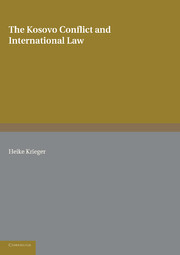Book contents
- Frontmatter
- Contents
- Map
- Preface
- Chronology
- Introduction
- Chapter 1 Kosovo's Status in Yugoslavia before 1999
- Chapter 2 Development of the Human Rights Situation pages 14 to 40
- Chapter 2 Development of the Human Rights Situation pages 41 to 64
- Chapter 2 Development of the Human Rights Situation pages 65 to 90
- Chapter 2 Development of the Human Rights Situation pages 90 to 114
- Chapter 3 Diplomatic Efforts for the Settlement of the Crisis pages 115 to 146
- Chapter 3 Diplomatic Efforts for the Settlement of the Crisis pages 147 to 187
- Chapter 3 Diplomatic Efforts for the Settlement of the Crisis pages 187 to 217
- Chapter 3 Diplomatic Efforts for the Settlement of the Crisis pages 218 to 253
- Chapter 3 Diplomatic Efforts for the Settlement of the Crisis pages 253 to 286
- Chapter 4 Military Action against Yugoslavia pages 287 to 313
- Chapter 4 Military Action against Yugoslavia pages 314 to 352
- Chapter 5 Settlement of the Crisis
- Chapter 6 Statement by NATO Memeber States
- Chapter 7 International Reactions to the Crisis pages 424 to 460
- Chapter 7 International Reactions to the Crisis pages 461 to 499
- Chapter 8 Court Action with regard to the Kosovo Crisis
- Chapter 9 Implementation of the Principles for a Political Solution of the Conflict
- Chronological List of Documents
- Select Bibliography
- Index
Chapter 7 - International Reactions to the Crisis pages 461 to 499
Published online by Cambridge University Press: 05 July 2014
- Frontmatter
- Contents
- Map
- Preface
- Chronology
- Introduction
- Chapter 1 Kosovo's Status in Yugoslavia before 1999
- Chapter 2 Development of the Human Rights Situation pages 14 to 40
- Chapter 2 Development of the Human Rights Situation pages 41 to 64
- Chapter 2 Development of the Human Rights Situation pages 65 to 90
- Chapter 2 Development of the Human Rights Situation pages 90 to 114
- Chapter 3 Diplomatic Efforts for the Settlement of the Crisis pages 115 to 146
- Chapter 3 Diplomatic Efforts for the Settlement of the Crisis pages 147 to 187
- Chapter 3 Diplomatic Efforts for the Settlement of the Crisis pages 187 to 217
- Chapter 3 Diplomatic Efforts for the Settlement of the Crisis pages 218 to 253
- Chapter 3 Diplomatic Efforts for the Settlement of the Crisis pages 253 to 286
- Chapter 4 Military Action against Yugoslavia pages 287 to 313
- Chapter 4 Military Action against Yugoslavia pages 314 to 352
- Chapter 5 Settlement of the Crisis
- Chapter 6 Statement by NATO Memeber States
- Chapter 7 International Reactions to the Crisis pages 424 to 460
- Chapter 7 International Reactions to the Crisis pages 461 to 499
- Chapter 8 Court Action with regard to the Kosovo Crisis
- Chapter 9 Implementation of the Principles for a Political Solution of the Conflict
- Chronological List of Documents
- Select Bibliography
- Index
Summary
257f. United Nations General Assembly, 54th Session, 9th Plenary Meeting, 22 September 1999
[…]
[1] Address by Mr. Ismail Omar Guelleh, President of the Republic of Djibouti: […] [15] The Somalis, too, have human rights; they have the same right as others to be protected from opressive, malicious and power-hungry individuals who continually and freely move from one capital to another, raising funds and securing armaments. Although these individuals are responsible for the destruction of their country, for the deaths of tens of thousands of innocent civilians, countless numbers of casualties and for the paralysis that immobilizes the country to this day, the international community did not intervene in Somalia, “to defend humanitarian principles and to stand up for the values of civilization and justice”, as one Western leader stated in justifying the Kosovo operation. The United Nations Operation in Somalia was also saddled with ambiguities in its mandate and there was never an intention to rid the country of the warlords.
Furthermore, Kosovo represents a clear case of determined and vigorous action to achieve a specific objective – to drive the marauding Serb army from Kosovo. Furthermore, the United Nations operation in Kosovo is vested with unprecedented power, because the circumstances warrant the exercise of nearly sovereign powers. It has authority over the territory, the people of Kosovo, the legislative and the executive powers of Kosovo, including the administration of the judiciary system.
- Type
- Chapter
- Information
- The Kosovo Conflict and International LawAn Analytical Documentation 1974–1999, pp. 461 - 499Publisher: Cambridge University PressPrint publication year: 2001



